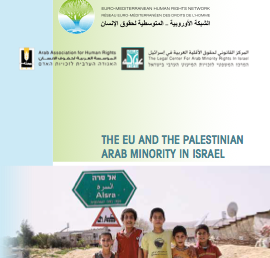On the International Day for the Protection of the Child: Blatant discrimination in early childhood education for Arab children in Israel
Photo by Amal Shoufany / Adalah
Today, 1 June 2015, on the International Day for the Protection of the Child, Adalah released a position paper on “Inequality of Opportunity in Early Childhood Education: The case of 3- and 4-year-old Palestinian Arab children in Israel.” Adalah Attorneys Muna Haddad and Sawsan Zaher wrote the paper based on data collected by Adalah from several official sources. The data confirms the gross discrimination faced by Palestinian Arab children in the field of early childhood education.
The headline statistic is that in 2014, 75% of 3-4 year old Arab Bedouin children in Israel did not have any educational framework, while this figure did not exceed 5% for Israeli Jewish children at that age. The main reason behind this huge gap, according to the position paper, is the acute shortage of kindergartens and transportation to existing kindergartens. Adalah sent letters to the Education Ministry over the last months demanding a detailed program to secure kindergarten education in the Arab Bedouin villages in the Naqab, but the Ministry did not respond.
The Compulsory Education Law requires that the state provide compulsory education for 3-4 year olds, however since the passage of amendments to the law 30 years ago, which lowered the compulsory age from 5 to 3-4 years of age, there has been sparse implementation. The law is due to go fully into effect in the 2015-2016 school year.
The position paper notes that in his 2015 report, the State Comptroller emphasized that the Education Ministry approves only a small percentage of requests by Arab local authorities to open kindergartens in Arab towns and villages. For example, the government-planned Arab Bedouin town of Hura requested the opening of 13 kindergartens from 2012-2014, however, the Ministry of Education approved only 4 of them. This meager number is in stark contrast to figures noted in a report by the Al Tufula early childhood center in Nazareth, which stresses that more than 1,050 kindergartens are needed in Palestinian Arab towns and villages in Israel.
The State Comptroller's report highlights another disparity: Israeli Jewish children receive 35 hours a week of kindergarten education, while Arab children receive only 30 hours of instruction. Moreover, Jewish pupils receive at least 16% more money per child from the Education Ministry than Arab children: Jewish children receive NIS 807, while Arab children get only NIS 693.
Adalah Attorney Muna Haddad emphasized that, "The research proves the existence of a problem of the utmost importance to early childhood growth and development. Although the Compulsory Education Law will come into effect in the next academic year concerning children aged 3 years-old and above, the Education Ministry did not provide any appropriate solutions for the Arab towns.”
Attorney Haddad added that, "The Ministry of Education must take responsibility and must take the steps required to reduce the gaps between the Israeli Jewish and Arab children, including the opening of schools, the allocation of certain resources equally, and the allocation of “affirmative action” budgets that are commensurate with the difficult circumstances faced by the Arab education system. Further the Education Ministry must ensure the enrollment of Bedouin children from aged 3 to kindergarten, in accordance with the law."














